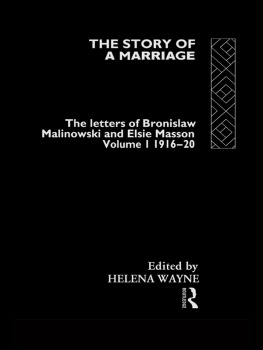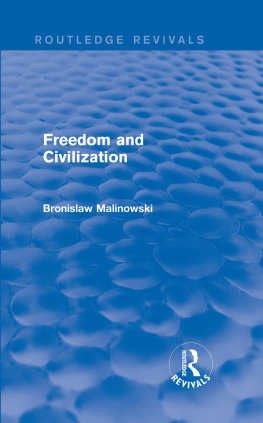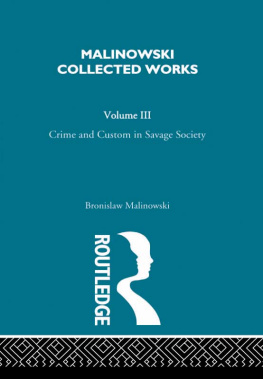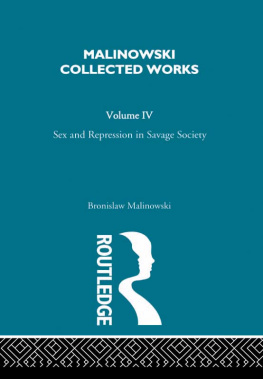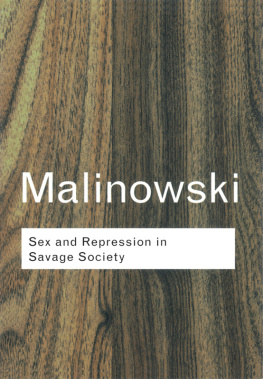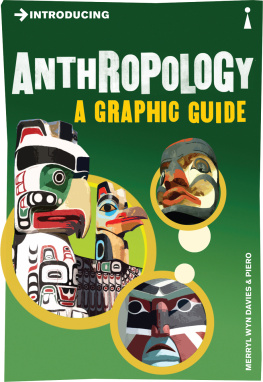Routledge Library Editions
A Diary in the Strict
Sense of the Term
Routledge Library Editions
Anthropology and Ethnography
SOUTH PACIFIC AND AUSTRALASIA
In 9 Volumes
I | The Great Village | Belshaw |
II | Under the Ivi Tree | Belshaw |
III | The Chimbu | Brown |
IV | Mambu | Burridge |
V | Sorcerers of Dobu | Fortune |
VI | Migrations, Myth and Magic from the Gilbert Islands | Grimble |
VII | A Diary in the Strict Sense of the Term | Malinowski |
VIII | Rautahi | Metge |
IX | Coming into Being among the Australian Aborigines | Montagu |
A Diary in the Strict
Sense of the Term
BRONISLAW MALINOWSKI
First published in 1967
Reprinted in 2004 by
Routledge
2 Park Square, Milton Park, Abingdon, Oxon, OX14 4RN
Transferred to Digital Printing 2006
Routledge is an imprint of the Taylor & Francis Group
1967 Valetta Malinowska
Reprinted by permission of The Continuum International Publishing Group
All rights reserved. No part of this book may be reprinted or reproduced or utilized in any form or by any electronic, mechanical, or other means, now known or hereafter invented, including photocopying and recording, or in any information storage or retrieval system, without permission in writing from the publishers.
The publishers have made every effort to contact authors/copyright holders of the works reprinted in Routledge Library Editions Anthropology and Ethnography. This has not been possible in every case, however, and we would welcome correspondence from those individuals/companies we have been unable to trace.
These reprints are taken from original copies of each book. In many cases the condition of these originals is not perfect. The publisher has gone to great lengths to ensure the quality of these reprints, but wishes to point out that certain characteristics of the original copies will, of necessity, be apparent in reprints thereof.
British Library Cataloguing in Publication Data
A CIP catalogue record for this book is available from the British Library
A Diary in the Strict Sense of the Term
ISBN 978-0-415-33056-5
Miniset: South Pacific and Australasia
Series: Routledge Library Editions Anthropology and Ethnography
Printed and bound by CPI Antony Rowe, Eastbourne

Facsimile page from Trohriands diary, beginning with entry for April 22, 1918

A DIARY IN THE
STRICT SENSE OF
THE TERM by Bronislaw
Malinowski

TRANSLATED BY NORBERT GUTERMAN
ROUTLEDGE & KEGAN PAUL
LONDON
First published in Great Britain in 1967
by Routledge & Kegan Paul Ltd.
Broadway House
68-74. Carter Lane
London, E.C. 4
Printed in the United States of America
1967 Valetta Malinowska
No part of this booh may be reproduced
in any form without permission from
the publisher, except for the quotation of
brief passages in criticism
Bronislaw Malinowski was already in the United States when the Second World War broke out, and he accepted what was at first a temporary, and later a permanent post, as Professor of Anthropology at Yale University. Naturally he needed a considerable amount of the manuscripts, notes, and books which he had left at the London School of Economics on leaving for the United States for his sabbatical leave at the end of 1938; and after accepting the Yale appointment he made a careful selection of these, to be sent to him at New Haven, while the greater part of his books and papers were stored away in the London School of Economics for the duration of the war. In New Haven, part of this material was kept at his home, and the rest was kept in his office at the Yale Graduate School.
In May 1942, Malinowski died suddenly of an entirely unpredicted heart attack. One of the first people to come to New Haven on hearing the bad news was Dr. Feliks Gross, friend and former student of Malinowskis, who offered to help in the special task of sorting and ordering Malinowskis books and papers, beginning with the contents of the Graduate School office. While this work was going on, Dr. Gross suddenly telephoned me from that office, asking if I knew of the existence of a smallish thick black notebook which he had just found, containing a diary of Bronislaw Malinowski, written almost entirely in Polish in his handwriting. Dr. Gross brought the notebook straight over to me and translated a few entries chosen at random which referred to his field work in Southern New Guinea. Malinowski had never mentioned to me the existence of this diary; I kept it carefully and took it with me to Mexico when I moved there permanently in 1946.
Sometime after the end of the war, Malinowskis books and papers were taken from their storage place in the London School of Economics, and about 1949 this considerable mass of manuscripts, notes, and books was sent to me in Mexico; among these I found two envelopes containing notebooks, one marked Early Polish Diary and the other Diaries. All of these small notebooks were written in Polish. I put these with the first notebook found at Yale, with the idea of having them translated and possibly published at some later date.
The diaries remained, therefore, locked away until the end of 1960, when I made a visit to New York. There I spoke of the diaries to one of Malinowskis publishers; and we decided on their publication. Mr. Norbert Guterman was kind enough to undertake the translation from Polish, which he rendered in a very direct manner. In correcting the proofs I have tried to assure the closest possible adherence to Malinowskis personal use of English words and phrasing, in which language in the latter part of his life he expressed himself with such freedom. A few extremely intimate observations have been omitted, the omissions being indicated by dots. The early Polish diary has not been included because it antedates Malinowskis anthropological career.
I have always felt a desireeven a needto know something of the life and personality of any painter, writer, musician, or scientist whose work has profoundly interested or moved me. I feel that the psychological and emotional light shed by diaries, letters, and autobiographies not only give one a fresh insight into the personality of the man who wrote certain books, developed a certain theory, or composed certain symphonies; but that through this knowledge of that man as he lived and felt, one is often brought into a closer contact and a greater comprehension of his work. When there exists, therefore, the diary or autobiography of an outstanding personality, I feel that these data regarding his daily and inner life and his thoughts should be published, with the deliberate aim of revealing that personality, and linking up this knowledge with the work left behind.





 A DIARY IN THE
A DIARY IN THE

